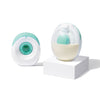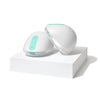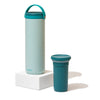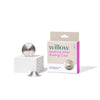As a breastfeeding mama, your baby is using the liquid gold you made yourself. Crazy to think about, right? Although feeding your baby in this way is an incredible thing, you might still wonder how breastfeeding affects your body.
Just like pregnancy, breastfeeding will change certain things about your body, but it’s nothing to be worried about. The changes associated with breastfeeding are normal.
How Do Breasts Change During Breastfeeding?
You can expect your breasts to change during and after pregnancy, whether you choose to breastfeed or bottle-feed your baby. During pregnancy, your breasts may feel sore to the touch or tender. They might also get bigger quickly, resulting in the veins under your skin showing more prominently.
How Do Breasts Change During Breastfeeding?
After the birth of your baby, you’ll start to notice your breasts becoming fuller as your milk comes in. This feeling of fullness may persist for a while as your body gets used to feeding your baby.
During the time you breastfeed your baby, your breasts will remain larger than they were pre-pregnancy. This is mainly due to the milk you’re carrying each day. You may also notice your breasts feeling fuller when it’s time to pump or feed your baby.
Will Breastfeeding Ruin My Boobs?
This is a question a lot of new moms want to know the answer to. The truth is, as you wean your baby, your breasts will begin to shrink in size due to the decreasing amount of milk. This change affects all moms differently, depending on the unique makeup of your body.
For example, some moms experience breasts that are fuller than before baby. Other breasts may be flatter or look a bit stretched. It’s also possible that each breast might look slightly different, as they are independent of each other.
Hey mama? Don’t let the changes you experience after breastfeeding steal your confidence. Your body has housed and fed another human being. Hold your head up high like the queen that you are.
Breastfeeding & Weight Loss
Can you lose weight while breastfeeding? According to a medical study, breastfeeding can help your uterus return to its pre-pregnancy size faster. It can also lead to a faster return to your pre-pregnancy weight.
On average, moms who exclusively breastfeed may see a loss of 1-2 pounds per month. Additional studies have shown that breastfeeding moms do tend to lose more weight than moms who don’t choose to breastfeed.
Of course, the amount of weight you lose while breastfeeding depends greatly on how active you are, what you eat, how much water you drink and other factors. Plus, your body is unique, so don’t compare yourself to others. You experience more or less weight loss than other moms who are breastfeeding. That’s normal!
Oat Mama Lactation Supplement
Oat Mama Lactation Supplement
Oat Mama's proprietary blend of galactagogues (milk-boosting herbs) includes alfalfa, goat's rue, milk thistle, moringa, shatavari, and spirulina. Plus it's gentle on the tummy.
Breastfeeding & Fatigue
As a new mom, we’re sure you’re aware of postpartum fatigue. And listen, it’s completely normal. Believe it or not, clinical studies show that breastfeeding doesn’t cause more fatigue than other feeding methods.
So, why do you feel like you could fall asleep standing up? First of all, you may have experienced a rough delivery process or might be recovering from a c-section. You’ve also got a newborn that requires round-the-clock feedings that interrupt your normal sleeping pattern.
It’s important to note that sometimes a medical condition can be the cause of feeling worn out. Some conditions include anemia, hypothyroidism or postpartum depression. Please see your doctor and talk about your concerns, so they can support you during this time.
Breastfeeding & Periods
Does breastfeeding affect your period? It most definitely can. In fact, it’s common for many moms to go without a period the entire time they’re breastfeeding (that’s good news, right?). For other moms, it’s possible to experience irregular periods.
Prolactin is a type of hormone that is responsible for breast milk production. Prolactin also prevents menstruation from occurring. So long as you breastfeed, prolactin levels will remain high. This may cause a lighter-than-normal period一or none at all.
As you wean your baby, your period is likely to return quickly. Again, all moms are different. The amount of time it takes for your period to return to normal will be unique.
Oat Mama Lactation Tea
Oat Mama Lactation Tea
Caffeine-free and artfully blended with the best organic, milk-boosting herbs to support a healthy supply on your pumping and nursing journey.
What Foods to Avoid While Breastfeeding
Certain foods can affect your milk supply while breastfeeding. And that milk supply can directly affect your baby. It’s important to nourish your body with foods that are healthy and avoid those things that can affect your baby’s nutrition. You gotta keep yourself and your baby healthy, mom!
Herbal Supplements
Herbal supplements are taken for a variety of reasons from helping with the common cold to ensuring a peaceful sleep. And while they’re generally safe, there are certain supplements you should avoid while breastfeeding as they may decrease your supply.
Some of the herbs you should try to avoid include:
- Black walnut
- Lemon balm
- Oregano
- Peppermint
- Sage
- Thyme
- Yarrow
This is not to say you can’t enjoy some oregano in your spaghetti sauce. You must simply use your best judgment and err on the side of caution. Avoid taking supplements that include these ingredients until after you wean your baby. We also recommend speaking to your doctor about any herbs before you ingest them.
Fish
Fish is a food that’s high in mercury. And mercury can affect your baby’s brain and nervous system if large amounts are ingested, per the CDC. Mercury can be passed from you to your baby through your breast milk, so it’s best to avoid it if possible.
Caffeine
According to the NCBI, caffeine can appear in breast milk fast after you consume it. Some symptoms such as jitteriness and poor sleep have been reported in babies after maternal caffeine intake.
The CDC recommends sticking to less than 300 mg of caffeine each day or around 2-3 cups of coffee to avoid adverse effects.
Alcohol
According to the CDC, not drinking alcohol while breastfeeding is the safest choice. Yet, they also state that one standard drink per day is not known to be harmful to your baby, so long as you wait at least 2 hours before nursing or pumping.
Alcohol in large amounts can pass through breast milk and result in damaging effects on your baby’s development and sleep patterns. Want a glass of wine with your dinner? Go for it as long as you can wait to breastfeed or have milk pumped for your baby. But, you might want to save the friend’s night out for after you wean your baby.
Food Allergens
If you or the baby’s father is allergic to a specific food or if you have a food sensitivity, it’s best to avoid that food completely. There’s a chance your baby will also be sensitive to those foods and show symptoms similar to yours after breastfeeding.
The most common food allergens to avoid include dairy, eggs, fish, peanuts, wheat, shellfish and soy.
This article was written in partnership with our International Board Certified Lactation Consultant, Wendy Wright, who loves working side by side with moms and babies to find that secret sauce! She’s also a mother of two and the Mom Experience Lead at Willow Pump.



















